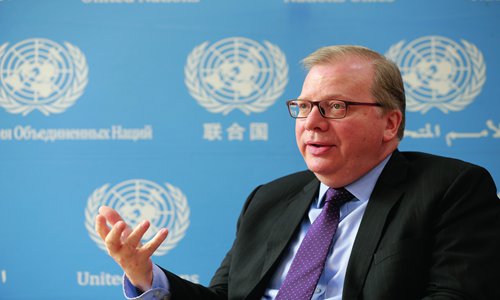IN-DEPTH / DIPLOMATIC CHANNEL
UN Resident Coordinator on China’s role changes

The UN Resident Coordinator in China Nicholas Rosellini Photo: Li Hao/GT
The economic development of China has not only brought about the significant changes for the lives of the Chinese people, but also the face of the world today. Seventy years ago, when the People's Republic of China (PRC) was founded, there were voices of doubtfulness from the outside world about China's ability to resolve basic issues, such as lifting its people out of poverty. Now, China as a UN member state has achieved significant results in poverty alleviation and reduction and plays an important and responsible role as the second largest economy in the international spectrum.As this year marks the 70th anniversary of the founding of the PRC and next year will mark the 75th anniversary of the establishment of the UN, China's cooperation with the organization is "standing at a new starting point," according to Zhang Jun, the new permanent representative of China to the UN, the Xinhua News Agency reported on Wednesday.
In the interview with the Global Times, the UN Resident Coordinator in China Nicholas Rosellini talked about his perspectives on China's growing important role in the world.
Stronger ties with UN
As the charter member of the UN and one of the five permanent members of its Security Council, China actively participates in international affairs, promotes the settlement of disputes through political and diplomatic means, and makes contributions to world peace, according to a recent statement by Zhang, Xinhua News Agency reported on Wednesday.
There are many things that show how China is playing an important role in development and its membership in the UN. Now, Chinese can be found in many important positions within the body, including the Under-Secretary-General for the UN Department of Economic and Social Affairs Liu Zhenmin and the Director-General of the UN Food and Agriculture Organization (FAO) Qu Dongyu, who both contribute vital parts to the maintenance of world peace and harmony.
Talking about Qu, who was newly appointed to the position in June, Rosellini said, "Qu is bringing a lot of experience in rural economy to his work," he said. "If one looks at the role of the FAO in terms of agricultural productivity, food security, and food safety, these are all very important issues around the world, and we have a situation of 821 million people who go to bed every night without enough food. The FAO has a very important role to play in helping the world achieve zero hunger."
Rosellini believes that Qu brings China's experience to help other developing countries learn through the FAO. "China's experience in poverty reduction and rural development are very strong, and that can be very important in terms of learning the lessons from China's successful rural development experience, which can be adopted by other countries."
The UN has a long presence here and has witnessed China's reform and opening-up along the way. Rosellini said that the role of the UN in China has also experienced some changes from the past till now. "Initially, the UN provided a lot of technical advice and systems [to China], and over time, we were shifting more to capacity development and institutional development, and piloting of projects," he said. "Now, we are moving into a role more about policy dialogue and about understanding China's developmental experience, and also being able to access our own global networks of expertise and knowledge on various developmental issues in China."
Globalization benefits the world
The whole purpose of the UN is to act as a platform for resolution of issues and concerns of the world. The UN operates in terms of peace and security, human rights, and development, and these are all the global goals which can be found on the UN charter.
Rosellini said that they need to bring nations together to discuss these issues, which doesn't mean that everyone agrees or interprets them the same way, but it's important that they do have discussions. "Globalization has enormous benefits for the world, which creates millions of jobs and helps nations grow economically. China is one good example of that," Rosellini said. He also admitted that globalization has also created displacement and difficulties in some countries and there is a crisis of confidence in people around the world in terms of how the world would look in the future.
"This push back on globalization is also effective in multilateral challenges, but we have had turbulent times in the past, and the UN is used to these setbacks sometimes, and at the end of the day, we still have platforms and are functioning," he said.
BRI for sustainable development
The UN's tasks in finding solutions about how to help countries address sustainability issues, including fiscal, social and environmental sustainability, parallels with that of the Belt and Road Initiative (BRI) in many ways. As the UN Resident Coordinator in China, Rosellini said on several occasions that the UN's major tasks in China this year are related to the linking BRI with sustainable development.
The BRI is a source of finance for many countries for their infrastructure development and energy sector development and the BRI is also partnering with new groups of countries together, bringing the enterprise and commercial sector into development-oriented work. Rosellini said that the leaders communique at the BRI forum is also about the quality of development and there is a great amount of stress being put on sustainability at the forum in the leaders communique. "So, I see there is a growing conversion and alignment about the policy level between the goals and attention of the BRI and sustainable development goals," he said.
As more and more countries are interested in learning from China, the UN has also shown its willingness to act as a bridge of support and understanding in between. "With our presence here, we can see how we can support countries adopt and understand what is relevant in different countries' situations from China's experience," Rosellini said. "The days of financing projects are over. We are not a donor, but we see ourselves as a development partner that can both learn from China and also offer experience to other countries based on China's experience."


